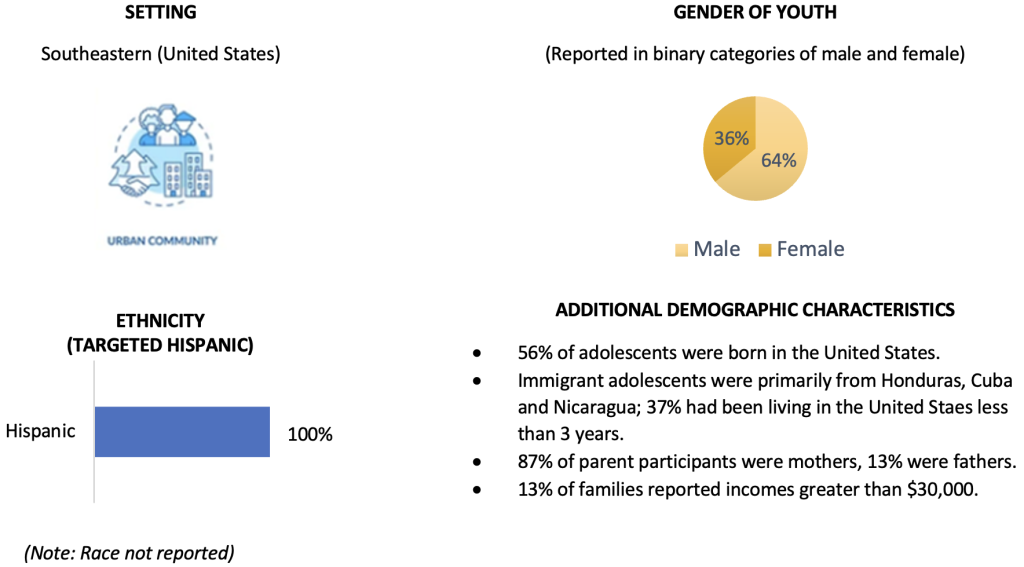Program Description: Familias Unidas™ is a multilevel family-based intervention for Latino or Hispanic families residing in the United States in an emerging immigration context that is designed to prevent substance use and sexual risk behavior in adolescents. Acculturation is a multidimensional construct that includes factors such as language use and proficiency, nativity, cultural behavioral preferences, and ethnic identity. Differences between parents and youth in their levels and rates of acculturation have the potential to create “acculturation gaps” that increase stress in a family and disrupt effective parenting and healthy youth adjustment. To be maximally effective in this culturally specific context, Familias Unidas addresses how parents manage the family environment.
Influenced by culturally specific models, the process first builds a strong parent-support network and then uses the network to increase knowledge of culturally relevant parenting, strengthen parenting skills, and apply new skills in a series of activities designed to help their adolescent children deal successfully with the challenges of daily life. The program is delivered primarily through multi-parent groups and family visits. The parent groups meet in 8 to 9 weekly two-hour sessions that are led by a Spanish-speaking bicultural facilitator. Each group has 12 to 15 parents, with at least one parent from each participating family. Group discussions aim to increase parents’ understanding of their role in protecting their adolescent from harmful and risky behaviors and to facilitate parental investment. Each family receives 4 to 10 one-hour visits in which parents are encouraged to apply the newly learned parenting skills while interacting with their adolescent.
Familias Unidas™ also involves meetings of parents with school personnel, including the school counselor and teachers, to connect parents to their adolescent’s school world. Family activities involving the parents, the adolescent, and his or her peers and their families allow parents to connect to their adolescent’s peer network and practice monitoring skills.
Results: Blueprints has certified one study evaluating Familias Unidas™. Pantin et al. (2009) randomly assigned 213 8th grade students with at least mild behavior problems in three Florida middle schools to intervention or control groups. Control families received three referrals to agencies in the catchment area that serve youth experiencing behavioral challenges. Parents and adolescents completed assessments in the language of their choice at baseline and 6, 18, and 30 months post baseline.
Youth who received Familias Unidas™ reported a lower rate of increase in substance use, compared with controls, from baseline to 30 months post baseline (15% to 25% vs. 13% to 34%). The two groups did not differ on engagement in sexual intercourse, but sexually active youth in the intervention group reported significantly increased levels of condom use from 6 months to 30 months post baseline compared with those in the control group. Additionally, family functioning improved significantly more in the intervention group than the control group, and parents in the treatment group reported a smaller percentage of youth displaying externalizing behaviors compared to parents in the control group.
Characteristics of Study Sample as Reported by Study Authors:

Cost-Benefits: In terms of cost-benefit analysis, Washington State Institute for Public Policy (December 2019) reports $2.99 in measured benefits per $1 spent in implementing Familias Unidas™.
Reference:
Pantin, H., Prado, G., Lopez, B., Huang, S., Tapia, M. I., Schwartz, S. J., . . . Branchini, J. (2009). A randomized controlled trial of Familias Unidas for Hispanic adolescents with behavior problems. Psychosomatic Medicine, 71, (9), 987-995.
Read the Program Fact Sheet
